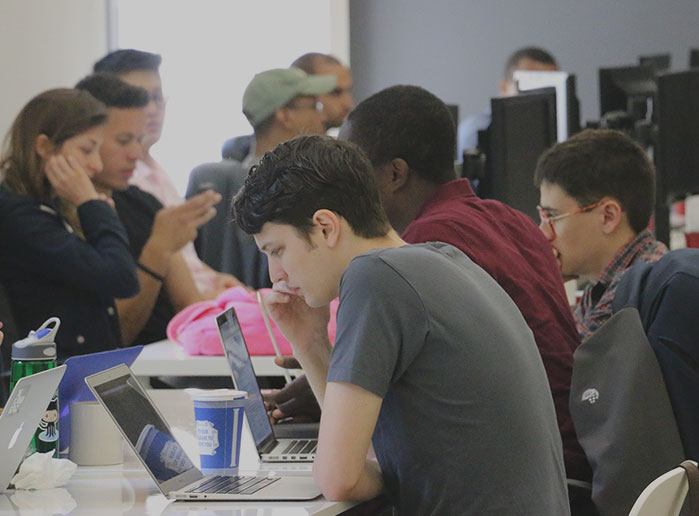Below are a few highlights from Course Report’s recent interview with Flatiron School alumnus Danny Dawson. For the full Q&A, head to Course Report.
Danny Dawson is not your average programmer. After high school, he went straight into the British Army, where he focused on telecommunications design. That telecommunications background led him to start a telecommunications and e-commerce business in London. See why Danny chose to attend NYC coding bootcamp Flatiron School through their online campus, Learn.co (and how he landed a job at PwC Ventures in Australia after graduating).
What is your pre-bootcamp story before Flatiron School?
I joined the Army straight from school, so instead of a university, I did a technical, telecommunications apprenticeship within the British Army. After being in the Army for seven years, I worked as a telecommunications network designer for a range of UK telecom companies. Then I set up an audio-visual installation company with a friends and ran that for a couple of years (we grew too fast and unfortunately had to close).
I spent the last 5-6 years as a principal engineering consultant and project manager for IT and Audio Visual projects.
What made you want to learn to code?
I’ve run a couple of companies in the audiovisual and e-commerce sectors. In my Audio Visual company, I generally dealt with technical design and the web development work. This was back in 2006, when I was just getting into web development, so I used a template and modified it with basic HTML and CSS.
I always wanted to learn more about the web because I really enjoyed that basic HTML and CSS. Last New Year’s, my resolution was to learn how to code so I could essentially build my own MVP for a new business idea I had. I took One Month Rails, which was a $50 course teaching Rails in 30 days. After building a Pinterest clone, it got me hooked and I knew I wanted to be a full-time programmer. Because I am entrepreneurial, it’s essential that I know how to code, otherwise I won’t understand the possibilities.
It’s been pretty hard, to be honest. But with each I course take, I fully believe that anyone can actually learn to code. You just have to expect to incorporate effort and push yourself.
What made you decide that a coding bootcamp like Flatiron School was the right educational path for you?
Because I was working full-time, I couldn’t really afford to go back to school full-time. I’m 33 now, and I didn’t complete the last two years of high school in the UK as I joined the Army, so it was out of the question for me to do a four-year degree. I’m sure doing a CS degree is beneficial to every programmer, but a four year track personally would not have worked for me.
I spent about 1.5 years teaching myself using online resources. I knew that I could build an app in Rails/Ruby, but I didn’t know the underlying technology behind it—the “why.” I’d always had my eyes on Course Report, and when I saw Flatiron School announce their Online Web Developer Program, it was the right time and the right place. I needed to continue working full-time, so I liked the fact that Learn.co was essentially self-paced.
I had a long chat with Flatiron School’s Dean, Avi, prior to doing the course—he’s brilliant! He’s really infectious with how he wants to teach people and how he wants others to learn. It just got me excited about joining the school. That’s how I chose it, really. In a way, it was like sort of like the luck of the draw but I think I chose it because Flatiron was one of the better schools out there. Flatiron School came up with an online platform right when I was thinking to doing it, and the price fit within my budget.
[irp posts=”1871″ name=”Learn.co: A New Type of Online Learning Platform”]How was the teaching style and feedback loop for Flatiron School’s online program?
Although you’re on your own, you never feel isolated – there are always instructors available, it’s easy to start study groups with fellow students, and there are live lectures you can join about three times a week. Because of my schedule, I wasn’t able to attend the lectures in real-time, but they were all recorded. You can go back and watch every lecture that someone has given online.
The teachers were pretty cool. They were always available to help if you needed them. Students could hit them up through Learn.co’s “Ask A Question” and built-in chat features, on Slack, or by dropping them an email.
[irp posts=”2422″ name=”Learning from Europe on Flatiron School’s Online Campus”]What was the job hunt like after you finished Flatiron School?
When I moved to Melbourne, I wasn’t in any technology circles and didn’t know any programmers. I started going to meetups, joined the Ruby Australia Slack channel, and went to a Ruby conference when I first arrived. By chance, I spoke to one of the lead devs at Pricewaterhouse Coopers (PwC) and said, “If you’re looking for a junior developer, I’ve got previous consultant experience, and I’d be very much interested in working at PwC.” When I finished Learn.co, I passed my CV to the product manager and got asked in for an interview. I went through four interviews; it was quite a long process. There was an initial phone screen interview, a coding challenge, an interview with the lead dev and product manager, and then there was an interview with the group director.
I now work at PwC as a Junior Web Developer and have been there for about a month.
Do you feel that Flatiron School has prepared you for your career as a developer?
Definitely. I learned a lot during my time at Flatiron School. At PwC, I’m working in a large application, but I’m comfortable. Looking at the code base, I can tell what’s going on and I already feel like I can contribute to the development. I definitely feel very much prepared.
What advice do you have for people who are thinking about making that career change and joining a coding bootcamp?
I’d say the first thing is to make sure you love coding. Make sure you’ve done loads of prep work; don’t just jump into it. It’s a lot of money to be spending, and not everyone loves programming. You can learn all the information you want, but if you don’t have the passion, the drive, and the excitement about programming, it’s hard to get junior dev role. Don’t fork out a lot of money if you don’t know that you love it.
Inspired by Danny’s story and interested in attending Flatiron School? Check out our brand new Coding Bootcamp Prep course.
Written byJOSH HIRSHFELD
Content Marketing Manager, Flatiron School

